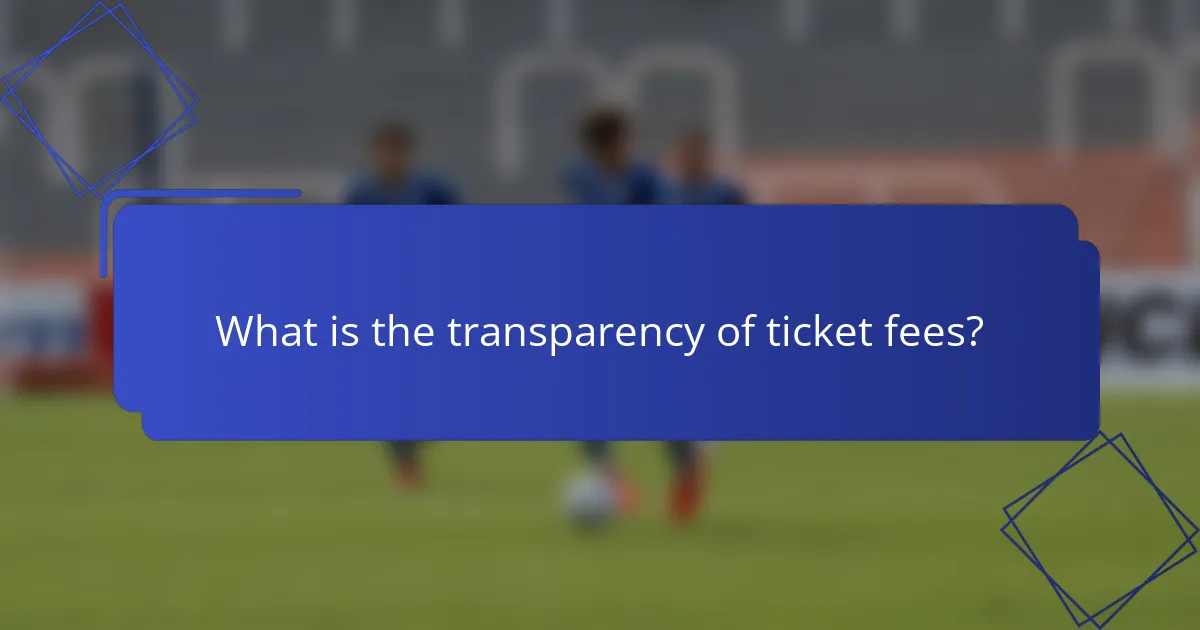Ticket fees in the United States encompass various charges such as service, convenience, delivery, processing, and facility fees, which can significantly impact the total price consumers pay for events. Transparency in how these fees are communicated is essential for helping buyers make informed decisions and understand the true cost of their tickets. By being aware of these additional costs, consumers can better navigate the ticket purchasing process and assess the value of their purchases.

What are the types of ticket fees in the United States?
In the United States, ticket fees can vary widely and typically include service fees, convenience fees, delivery fees, processing fees, and facility fees. Understanding these fees can help consumers make informed purchasing decisions and better anticipate the total cost of their tickets.
Service fees
Service fees are charges added by ticket sellers for the convenience of providing the ticketing service. These fees can range from a few dollars to a significant percentage of the ticket price, depending on the seller and the event.
When purchasing tickets online, be sure to check for service fees before completing your transaction, as they can substantially increase the overall cost. Some platforms may offer lower service fees than others, so comparing options can save money.
Convenience fees
Convenience fees are charged for the ease of purchasing tickets online or through a mobile app rather than at a physical box office. These fees are often justified by the seller as a way to cover the costs of maintaining digital platforms.
Convenience fees can vary widely, often falling between $2 to $10 per ticket. It’s advisable to consider whether the convenience of online purchasing outweighs the additional cost.
Delivery fees
Delivery fees are charges for the method of delivering the tickets to the buyer. Options may include standard mail, electronic delivery, or will-call pickup, each with its own associated fee.
Delivery fees can range from zero for electronic tickets to upwards of $20 for expedited shipping. Always review the delivery options available and their costs to choose the most economical method.
Processing fees
Processing fees are typically charged to cover the administrative costs of handling the ticket sale. These fees can be a flat rate or a percentage of the ticket price and are often non-refundable.
Processing fees can add anywhere from a few dollars to over $10 to your total ticket cost. Be aware of these fees when budgeting for your purchase, as they can impact the overall price significantly.
Facility fees
Facility fees are charges imposed by venues to support maintenance and operational costs. These fees are often included in the ticket price but may be listed separately during checkout.
Facility fees can vary greatly depending on the venue, sometimes reaching $5 to $15 per ticket. Understanding these fees can help you gauge the true cost of attending an event and make informed decisions about where to purchase tickets.

How do ticket fees impact overall pricing?
Ticket fees significantly influence the overall pricing of events by adding to the base cost that consumers see. These fees can vary widely, affecting the final amount paid and shaping perceptions of value and affordability.
Increased total cost
Ticket fees contribute to a higher total cost for consumers, often making events less accessible. For example, a ticket priced at $50 may end up costing $65 or more after fees are added. This increase can deter potential buyers, especially for budget-conscious individuals.
When purchasing tickets, it’s crucial to consider the full price, including all associated fees. Always check the final amount before completing a transaction to avoid surprises.
Perceived value changes
The presence of ticket fees can alter how consumers perceive the value of an event. If fees are high, attendees may feel that the event is overpriced, even if the base ticket price is reasonable. This perception can lead to dissatisfaction and reduced attendance.
To enhance perceived value, event organizers should strive for transparency regarding fees. Clearly communicating what the fees cover can help justify the total cost and maintain customer trust.
Market competitiveness
In a competitive market, ticket fees can affect an event’s attractiveness compared to similar offerings. Events with lower fees may draw more attendees, while those with higher fees risk losing potential customers to competitors. This dynamic can lead to price adjustments across the industry.
Event organizers should regularly review their fee structures in relation to competitors. Offering promotions or bundling services can help maintain competitiveness while managing overall pricing effectively.

What is the transparency of ticket fees?
The transparency of ticket fees refers to how clearly and openly these additional costs are communicated to consumers. Understanding ticket fees is crucial for making informed purchasing decisions, as they can significantly affect the final price of an event ticket.
Disclosure regulations
Disclosure regulations require ticket sellers to clearly outline all fees associated with a ticket purchase. In many regions, including the EU and the US, laws mandate that these fees be presented upfront, allowing consumers to see the total cost before completing a transaction.
For example, in the US, the Better Online Ticket Sales (BOTS) Act aims to curb deceptive practices by ensuring that ticket fees are disclosed transparently. This helps consumers avoid unexpected charges at checkout.
Consumer awareness
Consumer awareness plays a vital role in understanding ticket fees. Many buyers may not realize that additional charges can add a significant percentage to the ticket price, sometimes reaching 30% or more.
Educating oneself about common fees, such as service charges, processing fees, and delivery costs, can help consumers make better choices. Checking the total price before purchase is essential to avoid surprises.
Comparison tools
Comparison tools can assist consumers in evaluating ticket prices across different platforms. Websites and apps that aggregate ticket prices often include breakdowns of fees, making it easier to identify the best deals.
Using these tools, consumers can quickly compare the total costs of tickets for the same event from various sellers, ensuring they choose the most transparent option. Look for platforms that highlight all fees clearly to avoid hidden costs.

How do ticket fees vary by event type?
Ticket fees can differ significantly based on the type of event, affecting the overall price you pay. Factors such as venue size, demand, and ticketing platform influence these fees, which can range from a few dollars to a substantial percentage of the ticket price.
Concerts
Concert ticket fees often include service charges, processing fees, and delivery fees, which can add anywhere from 10% to 30% to the base price. Popular artists or sold-out shows may see higher fees due to increased demand and limited availability.
When purchasing concert tickets, consider buying directly from the venue or authorized sellers to avoid inflated fees. Additionally, keep an eye out for presale opportunities that may offer lower fees.
Sports events
Sports event ticket fees can vary widely depending on the sport, team popularity, and event location. Fees typically range from 5% to 25% of the ticket price, with premium events like playoffs or finals often incurring higher charges.
To minimize costs, check for group discounts or season ticket packages that may offer reduced fees. Be cautious of third-party sellers, as they may impose additional service fees that can inflate the total cost.
Theater performances
Theater ticket fees generally include handling and processing fees, which can account for 10% to 20% of the ticket price. High-demand shows, especially those on Broadway or in major cities, may have elevated fees due to their popularity.
For theater tickets, consider matinee performances, which often have lower fees compared to evening shows. Booking in advance can also help secure better prices and minimize additional charges.

What are the best practices for consumers regarding ticket fees?
Consumers can navigate ticket fees effectively by researching fees, utilizing price comparison websites, and understanding refund policies. These practices help ensure transparency and can lead to better purchasing decisions.
Researching fees
Before purchasing tickets, it’s crucial to research all associated fees, including service charges, processing fees, and delivery costs. These fees can significantly affect the total price, often adding 10-30% to the base ticket cost.
Look for detailed breakdowns of fees on ticketing platforms. Some sites may list fees upfront, while others may reveal them only at checkout, so be vigilant throughout the purchasing process.
Using price comparison websites
Price comparison websites can simplify the process of finding the best ticket prices by aggregating offers from multiple vendors. These platforms often highlight differences in fees, helping consumers make informed choices.
When using these sites, ensure they are reputable and up-to-date. Check for user reviews and ratings to gauge reliability. Remember that some comparison sites may charge their own fees, which can affect the final price.
Understanding refund policies
Refund policies vary widely among ticket sellers, so it’s essential to read the terms before making a purchase. Some tickets may be non-refundable, while others might allow partial refunds or exchanges under specific conditions.
Familiarize yourself with the seller’s policy on cancellations and changes, especially for events that may be rescheduled. Knowing these details can save you from unexpected losses if plans change.



